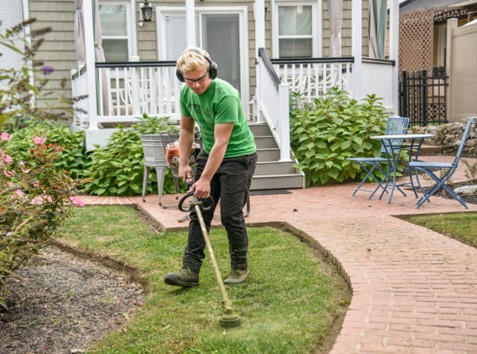Maintaining a healthy lawn goes beyond aesthetics. A lush green lawn looks great, but it also boosts curb appeal and can even increase your property value. If you have kids, the lawn can also become a soft, safe play area, so it’s important to keep it looking its best.
Despite its deceivingly simple looks, grass needs the right care and attention in order to thrive. Many well-intentioned homeowners have fallen victim to lawn care mistakes. In this article, we’ll explore the most common lawn care pitfalls, how to avoid them, and when a professional can help.
Mistake #1: Overwatering or Underwatering
We’ll start with the most obvious one: giving your lawn too much or too little water. While overwatering can cause root rot, promote fungal growth, and lead to an all-around unhealthy lawn, underwatering isn’t much better. Starving your lawn of water can result in dry, brown patches that are extremely difficult to revive. Striking the right balance is crucial.
The generally accepted best practice is to give it around 1 inch of water every week. This is not a hard and fast rule; it depends on your lawn size, soil type, and climate. A professional lawn care expert can assess your lawn’s specific needs and give you advice on the right amount of watering. They use tools like moisture sensors and other tools to determine exactly what your lawn requires. They can even set up an automated irrigation system for peace of mind that your lawn is getting watered on schedule, even when you’re not at home.
Mistake #2: Mowing Too Short
It’s a common misconception that mowing your lawn shorter will mean less frequent mowing. However, cutting grass too short can do much more harm than good. Referred to as ‘scalping’, this practice makes the grass weaker and more susceptible to factors like diseases, pests, and weeds. It can also dry out due to overexposure to the sun. Lawn care professionals understand the optimal height for different types of grass, so you can trust them not to over-mow and damage your lawn.
Mistake #3: Ignoring Soil Health
The key to plant health ultimately lies in the soil. Fortunately, you can test your soil and treat it for any contaminants if necessary. In urban and former industrial areas, the risk for contaminants is highest. Common contaminants include pesticides, radon, lead, asbestos, petroleum products, and other harmful chemicals. These can come from industrial dumping, poor waste management, and heavy local traffic.
Even oil runoff from your car in the driveway can end up in your soil! Lawn care professionals are well-versed in soil testing and have the ability to test and improve soil health. They’ll look for things like imbalances in pH levels or nutrient deficiencies, then recommend treatments such as compost, soil conditioners, or fertilizers.
Mistake #4: Using the Wrong Fertilizer
When it comes to fertilizer, it’s not only important to choose the right one, but how you apply it matters as well. If you over-fertilize, you can burn the grass. This can also happen if you don’t spread the fertilizer evenly. If you don’t use enough fertilizer, your lawn may be weak and malnourished. A lawn care expert can advise on the right type of fertilizer for your lawn and apply it professionally so you don’t get any burned or weak patches.
Mistake #5: Neglecting Lawn Aeration
Aeration is one of the most underrated lawn care steps. It can have a massive impact on lawn health, but it’s often overlooked. You can aerate your lawn yourself using a simple manual rolling aerator; in this case, simple is still effective. There are plenty of modern electric and cordless models now, as well. However, if you’re not confident, some jobs are best left to the professionals.
Common Lawn Care Mistakes to Avoid
Keeping your lawn looking green and pristine takes more than the occasional watering. It needs proper planning and a bit of TLC. Try to avoid under or over-watering and scalping, and take care of your soil health and fertilizing practices. Finally, don’t forget to aerate your lawn. If you need a helping hand, professional lawn care specialists have the knowledge and tools to ensure your lawn thrives year-round.
Photo by Jared Muller on Unsplash

